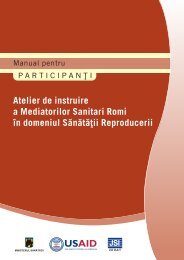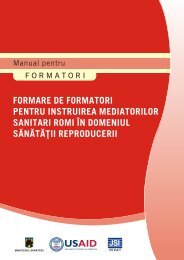Training of Roma Health Mediators in Reproductive Health
Training of Roma Health Mediators in Reproductive Health
Training of Roma Health Mediators in Reproductive Health
Create successful ePaper yourself
Turn your PDF publications into a flip-book with our unique Google optimized e-Paper software.
Condoms provide “dual protection.” They prevent pregnancy and reduce the risk <strong>of</strong><br />
gett<strong>in</strong>g HIV/AIDS or other sexually transmitted <strong>in</strong>fections.<br />
You can get HIV by eat<strong>in</strong>g food prepared by a person who has the <strong>in</strong>fection.<br />
(FALSE)<br />
HIV/AIDS is not spread this way. (See previous answer.)<br />
The virus that causes AIDS is also spread by <strong>in</strong>sect bites. (FALSE)<br />
HIV/AIDS is not spread this way. (See previous answer.)<br />
You can get HIV/AIDS if an <strong>in</strong>fected person coughs or sneezes on you. (FALSE)<br />
HIV/AIDS is not spread this way. (See previous answer.)<br />
A person can get HIV by us<strong>in</strong>g dirty <strong>in</strong>jection needles, other needles, or razors,<br />
(TRUE)<br />
Blood with HIV <strong>in</strong> it may be left on the needle or razor, and passed on to the next user.<br />
You can usually tell if a person has HIV by look<strong>in</strong>g at him/her. (FALSE)<br />
A person with HIV may look and feel healthy for a very long time. However, even if an<br />
<strong>in</strong>fected person appears healthy, he or she can still pass the HIV <strong>in</strong>fection to others<br />
through unprotected sex or by shar<strong>in</strong>g dirty needles or syr<strong>in</strong>ges. Many people with HIV<br />
do not even know they are <strong>in</strong>fected.<br />
A person who looks and feels healthy can be carry<strong>in</strong>g the HIV virus and still <strong>in</strong>fect<br />
others. (TRUE)<br />
Many people with HIV do not even know they have this <strong>in</strong>fection. (See previous answer.)<br />
A blood test can determ<strong>in</strong>e whether you have HIV. (TRUE)<br />
A simple blood test can determ<strong>in</strong>e whether a person is <strong>in</strong>fected with HIV. The test looks<br />
for HIV antibodies. If there are HIV antibodies <strong>in</strong> the blood, the person is HIV positive.<br />
However, once a person is <strong>in</strong>fected with HIV it can take up to 6 months for the HIV<br />
antibodies to appear <strong>in</strong> the blood. This means an <strong>in</strong>fected person can spread HIV to others<br />
even before the test shows that the person is HIV positive (hav<strong>in</strong>g an HIV negative<br />
result).<br />
HIV can be cured if diagnosed early. (FALSE)<br />
There is presently no cure for HIV/AIDS. Some people with HIV get sick and die sooner<br />
than others. Some people have lived with the <strong>in</strong>fection for more than 10 years. Although<br />
HIV/AIDS cannot be cured at this time, it can be prevented. To prevent HIV/AIDS<br />
follow the safer sex practices described <strong>in</strong> previous answers.<br />
Anyone can get AIDS if they are exposed to the blood, vag<strong>in</strong>al fluid, or semen <strong>of</strong> an<br />
<strong>in</strong>fected person (TRUE)<br />
(See previous answers.)<br />
174<br />
RFHI/JSI <strong>Roma</strong>nia <strong>Tra<strong>in</strong><strong>in</strong>g</strong> <strong>of</strong> RHMs <strong>in</strong> <strong>Reproductive</strong> <strong>Health</strong> Session 10: STIs








